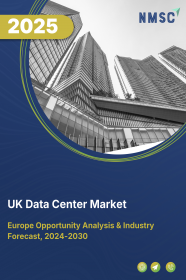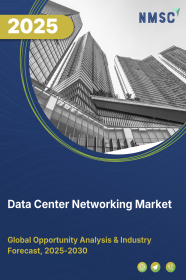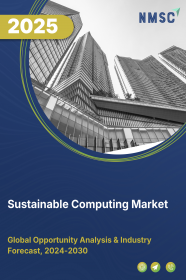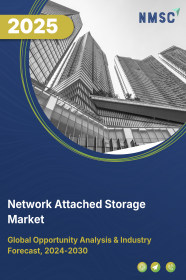
The UK Data Center Market by Infrastructure (Hardware, Software, and Services), by Type (Enterprise Data Centers, and others), by Data Center Rating (Tier I, and others), by Size (Small Data Centers, and others), by Power Capacity (<0.01 GW, and Others), by Server Rack Density (<10kW, and others), by Data Center Redundancy (N+1, and others), by PUE Outlook (Less than 1.2, and others), by Design Outlook (Traditional, and Others), and Others - Opportunity Analysis and Industry Forecast, 2024–2030
Industry: ICT & Media | Publish Date: 18-Aug-2025 | No of Pages: 210 | No. of Tables: 166 | No. of Figures: 111 | Format: PDF | Report Code : IC2424
UK Data Center Market Overview
The UK Data Center Market size was valued at USD 7.89 billion in 2023, and is predicted to reach USD 14.43 billion by 2030, at a CAGR of 9.0% from 2024 to 2030. The data center market, also known as network infrastructure, encompasses the entire lifecycle of specialized infrastructure dedicated to hosting computing systems, including planning, construction, operation, and maintenance. It comprises a range of components such as servers, storage systems, and networking gear, offering services such as cloud computing and connectivity solutions. Currently, the industry is experiencing widespread adoption of cloud services, coupled with the rise of edge computing to reduce latency.
Key trends include a focus on sustainability, heightened concerns about cybersecurity, the integration of hybrid and multi-cloud approaches, and the impact of 5G networks. These trends highlight the industry's adaptation to the increasing demand for scalable, efficient, and secure data processing and storage solutions amid the era of digital transformation. According to the United States International Trade Commission, the market for data processing and storage is expected to grow from USD 56 billion in 2020 to USD 90 billion by 2025.
Expanding Data Center Infrastructure Drives UK Market Growth
The UK data center market continues to experience robust expansion, positioning itself as a leading digital infrastructure hub in Western Europe. With over 512 operational facilities totaling more than 5.7 million square feet and a combined power capacity exceeding 1,100 megawatts, the sector demonstrates both scale and strategic depth. Key players like Equinix, Lumen Technologies, Telehouse, and Digital Realty offer a wide range of colocation and interconnection services, reinforcing the country’s critical role in supporting enterprise cloud deployments and digital services.
In parallel, the market is undergoing a significant construction boom, with 11 new data center projects currently underway across regions including London, Slough, Manchester, and Wales. This surge in infrastructure development reflects strong investor confidence and mounting demand for advanced computing environments. As businesses increasingly rely on real-time analytics, IoT, and hybrid cloud environments, the need for resilient, scalable, and low-latency facilities becomes even more critical. This expansion not only enhances the UK’s digital competitiveness but also opens new opportunities for hyperscalers, real estate developers, and utility providers
AI Investments Accelerate UK Data Center Market Expansion
Artificial intelligence is emerging as a transformative force within the UK data center market, driving demand for high-performance computing infrastructure. A standout example is Microsoft’s 3.16 billion USD investment to significantly expand its AI data center footprint in the UK. This includes the deployment of over 20,000 advanced GPUs by 2026, with new facilities planned for London and Wales. These developments are designed to support AI workloads across sectors like healthcare, finance, and manufacturing, where low-latency processing and massive data throughput are critical.
Beyond hardware, this strategic investment also includes training more than one million people in AI-related skills, aligning infrastructure growth with workforce development. As the UK government emphasizes AI safety and innovation leadership, such initiatives strengthen the nation's position in the global tech arena. These moves not only reinforce the digital backbone required for AI advancement but also stimulate the broader economy—fueling job creation, fostering R&D, and enhancing the UK’s appeal to global tech investors and enterprises seeking future-ready digital infrastructure.
High Initial Investment Hinders UK Data Center Market Growth
Despite the UK's strong position as a digital infrastructure hub, the data center market continues to face critical challenges, particularly due to the high initial capital investment required for new developments. Establishing modern data center facilities in the UK involves substantial upfront costs for real estate, power provisioning, advanced cooling systems, and compliance with local planning regulations. These financial demands can limit participation by startups and small to mid-sized enterprises, reinforcing market dominance by large cloud providers and multinational operators.
Additionally, the growing pressure to meet the UK’s net-zero and sustainability targets has introduced further financial burdens. Operators are increasingly required to invest in energy-efficient technologies, carbon offset strategies, and renewable power sourcing to comply with evolving environmental regulations. While these efforts align with long-term climate goals, they can significantly elevate operational costs and slow the pace of expansion, particularly in regions facing energy constraints or limited access to green infrastructure
Integration of Edge Computing Presents Lucrative Opportunity for UK Market Expansion
The growing adoption of edge computing is unlocking new avenues for growth in the UK data center market. By bringing data processing closer to end users, edge infrastructure reduces latency and supports real-time applications such as IoT, Augmented Reality (AR), autonomous vehicles, and smart city systems. This decentralized model not only alleviates pressure on central cloud infrastructure but also delivers enhanced performance, flexibility, and localized control—key advantages in an era of increasingly distributed digital ecosystems.
Edge computing also offers enhanced data privacy and security, as sensitive information can be processed locally without traveling long distances over the internet. This approach is particularly valuable in sectors like healthcare, finance, and critical infrastructure, where data sovereignty and responsiveness are crucial. The UK's rising interest in this area is evident through recent investments in edge-focused startups like Armada, as well as public and private initiatives aimed at expanding connectivity in underserved regions. These developments reflect a broader shift toward resilient, scalable infrastructure that supports the next generation of digital innovation.
Competitive Landscape
The key market players operating in the UK data center industry include Equinix Inc., Digital Realty Trust Inc., Amazon Web Services (AWS), Microsoft Azure, Google Cloud, NTT Global Data Centers, Global Switch Holdings Limited, CyrusOne Inc., Vantage Data Centers, Telehouse (KDDI), Iron Mountain Inc., Virtus Data Centres, Colt Data Centre Services, Rackspace Technology, IBM Cloud and others.
UK Data Center Market Key Segments
By Infrastructure
-
Hardware
-
IT Hardware
-
Servers
-
Storage Systems
-
Networking Equipment
-
-
Power Infrastructure Hardware
-
Uninterruptible Power Supplies (UPS)
-
Generators
-
Automatic Transfer Switches
-
Power Distribution Units (PDUs)
-
-
Mechanical Infrastructure Hardware
-
Computer-Room Air Conditioners (CRAC/CRA Units)
-
Chillers
-
Racks
-
Cable Management Systems
-
-
Safety & Security Hardware
-
Fire Suppression Systems
-
Physical Security Systems (CCTV, access controls)
-
-
-
Software
-
DCIM & Monitoring
-
Automation & Orchestration
-
Backup & Disaster Recovery
-
Security Software
-
Virtualization Software
-
Analytics & Reporting Software
-
Other Software
-
-
Services
-
Planning & Professional Services
-
Site & Building Design
-
System/Infrastructure Engineering
-
Professional Advisory (compliance, energy audits)
-
-
Integration & Deployment Services
-
Electrical & Mechanical Installation
-
Commissioning & Acceptance Testing
-
-
Operation & Support Services
-
Preventive & Corrective Maintenance
-
Facilities Management / Remote Monitoring
-
Support Services (helpdesk, onsite SLA support)
-
-
Hosting & Managed Services
-
Colocation & Cloud Hosting Services
-
Virtual/Private Hosting Platforms
-
-
By Type
-
Enterprise Data Centers
-
Colocation Data Centers
-
Cloud Data Centers
-
Hyperscale Data Centers
-
Edge Data Centers
-
Micro Data Centers
-
Others
By Data Center Rating
-
Tier I
-
Tier II
-
Tier III
-
Tier IV
By Size
-
Small Data Centers
-
Med-sized Data Centers
-
Large Data Centers
By Power Capacity
-
<0.01 GW (Small)
-
0.01-0.05 GW (Medium)
-
0.05-0.1 GW (Large)
-
0.1-0.5 GW (Hyperscale)
-
>0.5 GW (Mega-campus)
By Server Rack Density
-
<10kW
-
10-19kW
-
20-29kW
-
30-39kW
-
40-49kW
-
>50kW
By Data Center Redundancy
-
N (No Redundancy)
-
N+1 (Single-fault tolerant)
-
N+2 (Dual-fault tolerant)
-
2N (Full duplication)
-
2N+1 (Concurrently maintainable + extra spare)
-
3N/2N+2 (Multi-backup fault tolerant)
By PUE Outlook
-
Less than 1.2
-
1.2 - 1.5
-
1.5 - 2.0
-
Greater than 2.0
By Design Outlook
-
Traditional
-
Containerized
-
Modular
By End User
-
Cloud Service Provider
-
Technology Provider
-
Telecom
-
Healthcare
-
BFSI
-
Retail & E-commerce
-
Entertainment & Media
-
Government
-
Energy
-
Others
Key Players
-
Equinix Inc.
-
Digital Realty Trust Inc.
-
Amazon Web Services (AWS)
-
Microsoft Azure
-
Google Cloud
-
NTT Global Data Centers
-
Global Switch Holdings Limited
-
CyrusOne Inc.
-
Vantage Data Centers
-
Telehouse (KDDI)
-
Iron Mountain Inc.
-
Virtus Data Centres
-
Colt Data Centre Services
-
Rackspace Technology
-
IBM Cloud
REPORT SCOPE AND SEGMENTATION:
|
Parameters |
Details |
|
Market Size in 2023 |
USD 7.89 Billion |
|
Revenue Forecast in 2030 |
USD 14.43 Billion |
|
Growth Rate |
CAGR of 9.0% from 2024 to 2030 |
|
Analysis Period |
2023–2030 |
|
Base Year Considered |
2023 |
|
Forecast Period |
2024–2030 |
|
Market Size Estimation |
Billion (USD) |
|
Growth Factors |
|
|
Companies Profiled |
15 |
|
Market Share |
Available for 10 companies |
|
Customization Scope |
Free customization (equivalent up to 80 working hours of analysts) after purchase. Addition or alteration to country, regional, and segment scope. |
|
Pricing and Purchase Options |
Avail customized purchase options to meet your exact research needs. |














 Speak to Our Analyst
Speak to Our Analyst





















